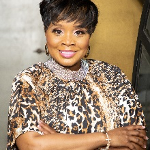
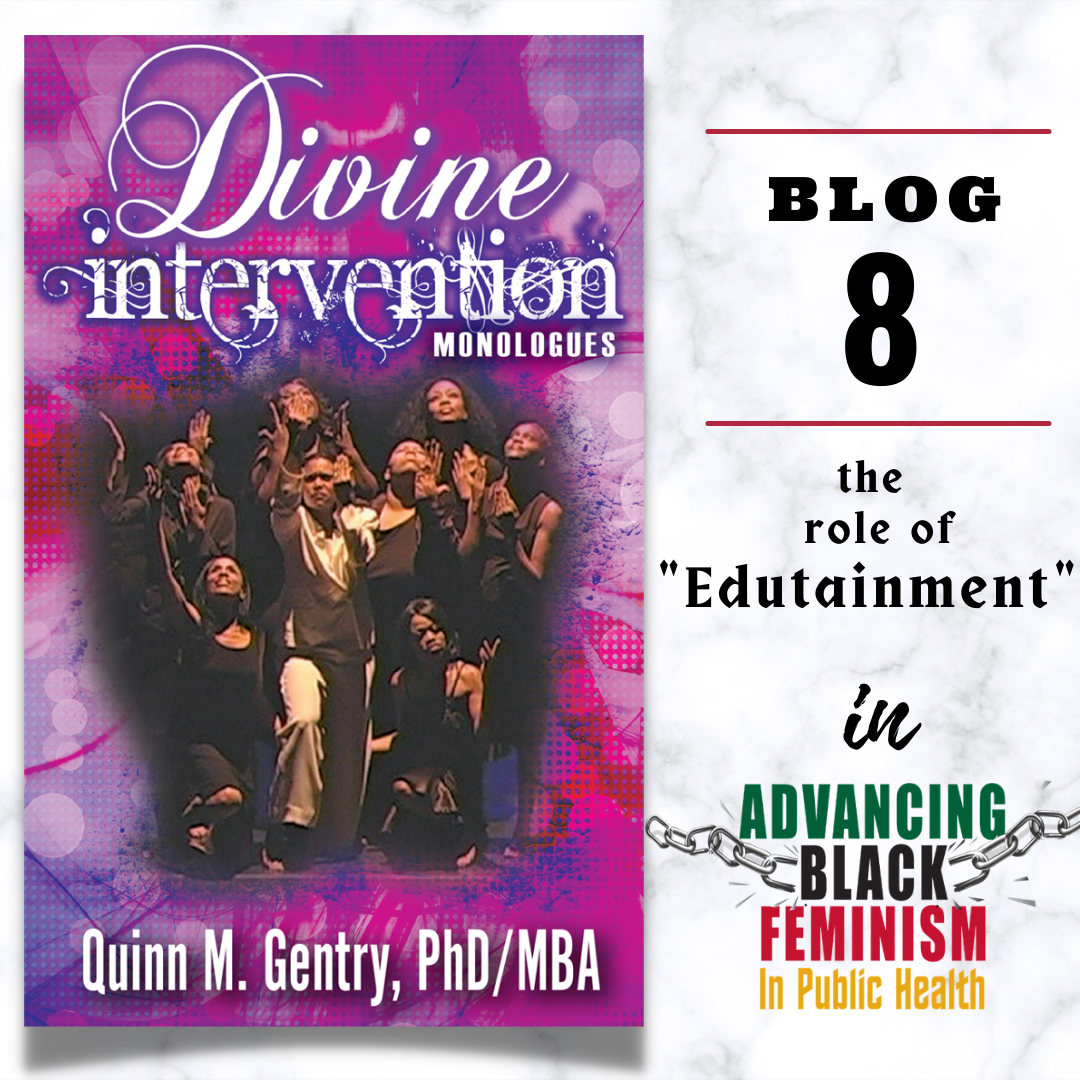
Welcome to my blog on “Advancing Black Feminism in Public Health.” My goal is to move black feminism from the margins to the center of public health by applying 10 key principles as legitimate and comprehensive frameworks for adequately addressing health threats and related social and structural determinants of health in the lives of black women and girls.
Dr. Quinn M. Gentry
In this blog, I highlight the value of the arts for broader dissemination as a key theme in principle no. 8 (of 10): Balance Rigorous Research and Evaluation with Responsible Application for advancing black feminism in public health. Institutionalizing the arts in public health as “edutainment” challenges taken-for-granted notions of “legitimate” knowledge generation and sharing of evidence-based findings. In this blog, I provide a glimpse into how I used the arts as unconventional strategies to share my clinical research dissertation results in a format that would be relevant to non-academics.
“As an historically oppressed group, U.S. Black women have produced social thought designed to oppose oppression. Not only does the form assumed by this thought diverge from standard academic theory, it can take the form of poetry, music, essays, and the like—but the purpose of Black women’s collective thought is distinctly different.”
Patricia Hills Collins, Black Feminist Thought Leader Tweet
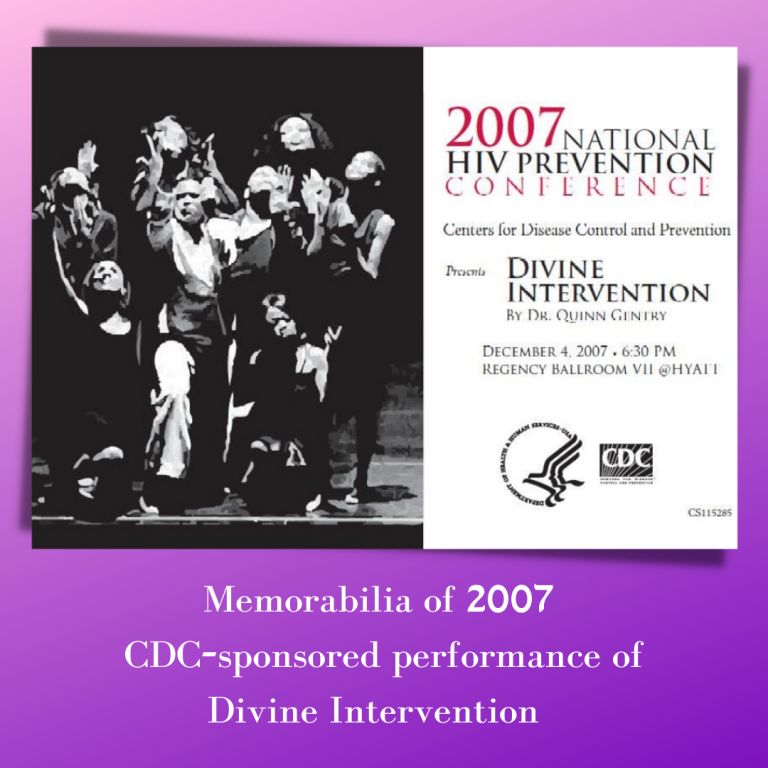
In the spring of 2003, I earned a Ph.D. degree in Sociology from Georgia State University. Indeed, it was a proud moment for all to witness another milestone in my journey from poverty to PhD! While I embraced traditional methods for dissemination my dissertation research findings (presenting and publishing), I never lost the thought that more innovative strategies were needed for broader community engagement.
From a consciousness-raising standpoint, I had the “great” idea to repurpose my dissertation interviews into monologues and present them in a stage-play setting. The “thought” of a play began to take shape as a viable “thing” in March of 2006, when I attended the “Vagina Monologues” at Georgia State University to support one of my students. Somewhere between “hair down there” and “angry vagina” it hit me: “The Divine Intervention Monologues”!
Now, it makes sense that Dr. Holmes, a professional playwright and director (see her quote below) would call me a “thug”, since it was my radical mind that set out to remove all obstacles and defy all logic in a “Tyler Perry” spirit of no-prior-formal-training-in-playwright-directing-or-producing. However, I determined that somehow, someway, “The Divine Intervention Monologues” would serve as my unique way of sharing my clinical research with the communities who bear the brunt of the burdens of substance abuse, mental illness, domestic violence, and homelessness among black women at a greater risk for HIV.
In my Tupac voice, “This one was for ‘dear momma’ who loved urban staged plays”, and even more, the Tyler Perry brand of storytelling through stage-play performances. In addition, I channeled my childhood performing arts experiences. However, the final confirmation set in after I immersed myself in scientific evidence indicating that oral traditions of storytelling and the performing arts were legitimate forms of knowledge dissemination.
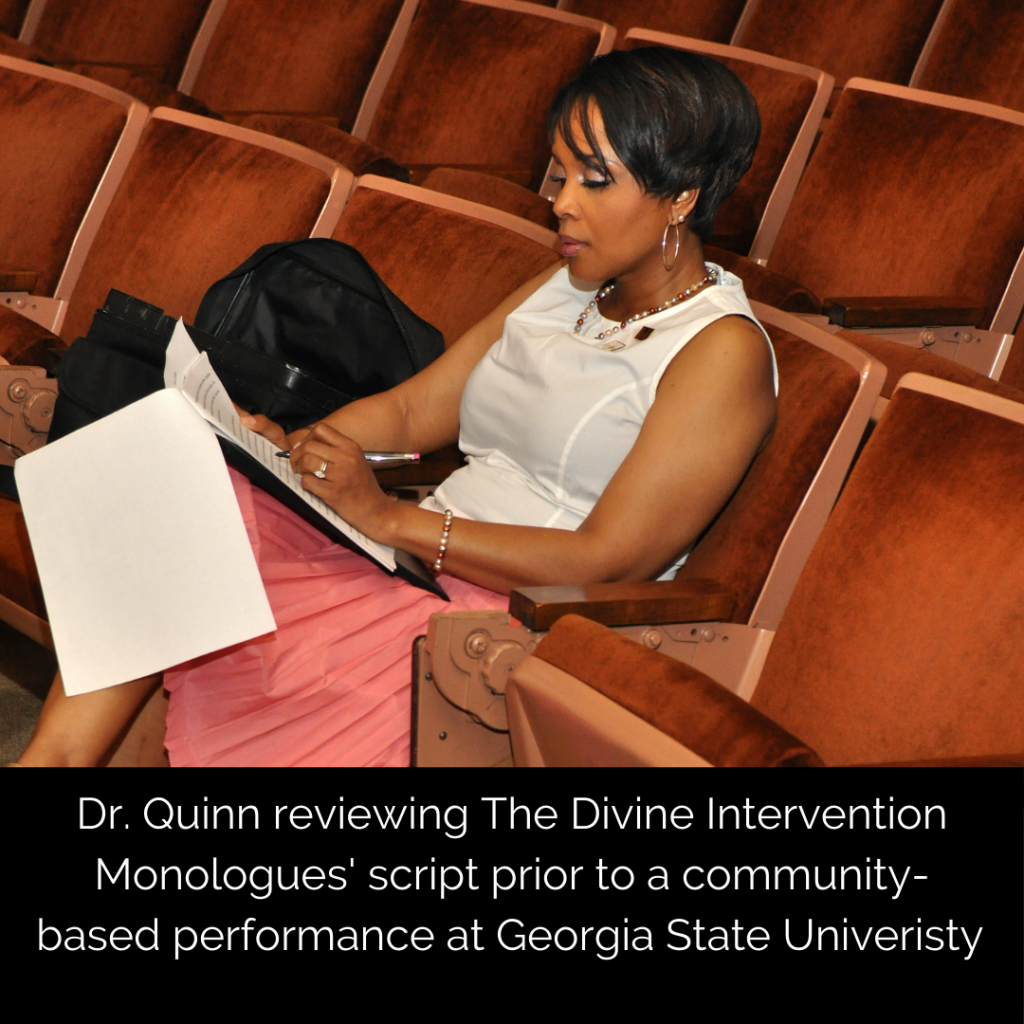
So, in my own “thuggish” way of challenging systems and eliminating barriers, I set out to create a cost-effective, yet impactful way to bridge the gap between “scientific data dissemination” and “entertainment”, in hopes of empowering organizations in addressing one or more of the factors placing women and girls at a greater risk for HIV.
"From the time I met her, I knew Dr. Quinn Gentry was thuggish! Not a thug, but thuggish. I know, this is an uncharacteristic way to talk about a brilliant, highly accomplished, innovative, compassionate scholar and behavior interventionist, but it is true.
Wait, let me clarify why I dare to say this. I’m defining thuggish in a TuPacian way as per the Urban Dictionary which suggests when you have overcome the obstacles to reach your aim…you’re a bit thuggish. From her biography to her ideology to her theology to her history and testimony, Dr. Gentry has proven that anything can be done with hard work and great faith.
From the time I met her, back in 2006, when Dr. Gentry invited me to direct a production of her already successful play, “Divine Interventions”, I have been absolutely amazed by her enthusiasm and passion to use theatre as a vehicle for social change. Although, at that time, she was treading new ground mounting her socially relevant drama about troubled at risk women, she met, and continues to meet, the challenge with two fisted love, investing her all in the fight for awareness and compassion of the less fortunate.
The rest is history. “Divine Intervention” has gone on to bless many both locally and nationally. It has been a highlight of my more than 30 year career in theatre to be a part of its history."Shirlene Holmes, Ph.D. Associate Professor in the Communication Department Georgia State University, Playwright, Director, and Performer Tweet
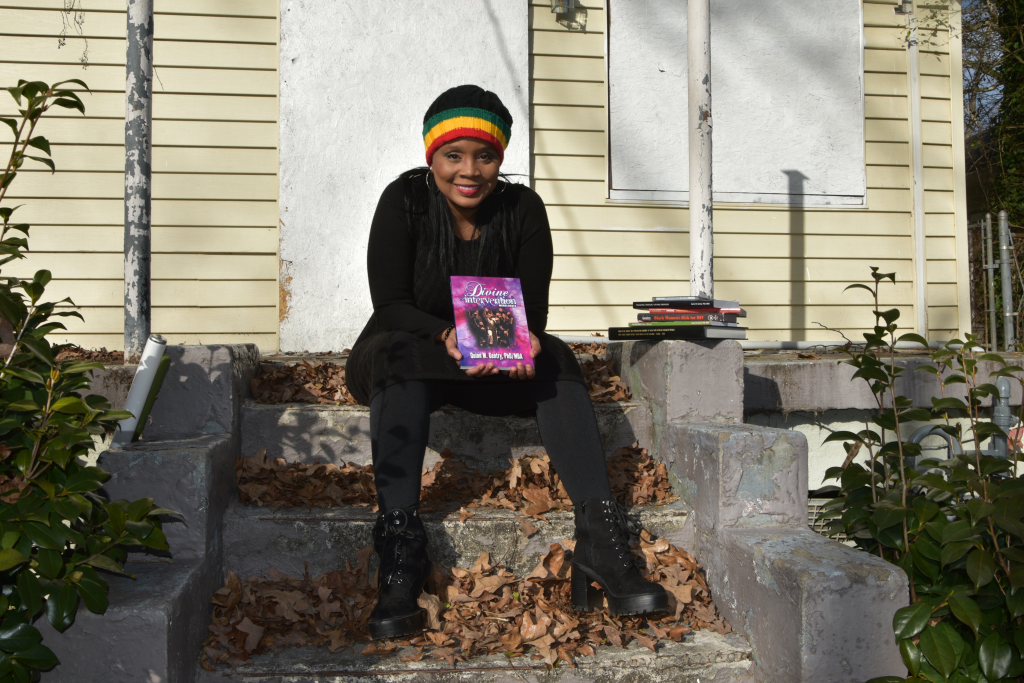
My overall vision for writing “The Divine Intervention Monologues” was to create a way to share the stories from my research with communities and stakeholders disproportionately impacted by the underlying issues that place black women at greater risk for HIV. Armed with $25,000.00 of my personal savings, some project management skills, and a team of friends who served admirably as volunteers, “The Divine Intervention Monologues” made its debut in January of 2007.
My fondest memory during the planning process was the day of casting, as well-over 100 talented actors camped out in a hotel lobby to get their chance to be part of this groundbreaking performance.
After the debut performance, I remember feeling a sense of pride that I was part of the team advocating for humanity on behalf of clinical intervention research participants everywhere: those whose lives are often relegated to variables, data points, statistical significances, and p-values once principal investigators and their research teams leave “the field” that I call “my community”.
Dr. Quinn, Intellectual Influencer Tweet
I have selected “lines” from the lived experiences of women from my dissertation study, as delivered by the actors cast to play them in the debut performance of “The Divine Intervention Monologues”.
At the writing of this blog, I am working on a production opportunity to share the stories in film or TV. If all goes well, I will change the quotes below to links to the full performances.
In the interim, I have selected a slice of their lives in the form of monologue lines that hopefully touches you personally or professionally, in a way that inspires you to engage marginalized people everywhere with a sense of urgency, but more than that, with a sense of empathy.


"I can relate to the abandonment, emotional abuse, bad relationships, and stolen dreams. As Dr. King so eloquently put it: “We are caught up in an inescapable network of mutuality, tied in a single garment of destiny. Whatever affects one of us directly, affects us all indirectly. Ladies and Gentlemen, this is a journey into the real life experiences of women directly affected by what indirectly affects us all: fear, failure, frustration, and yes, dysfunctional families."
Dr. Quinn, "The Divine Intervention Monologues" Playwright Tweet
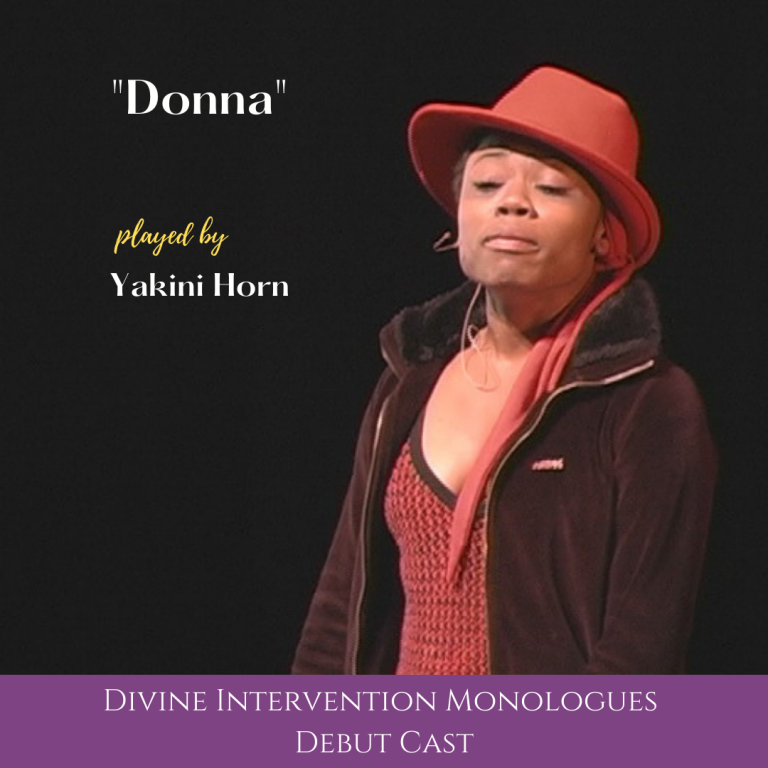
"Well let me tell you how all this got started. See, I was born in this game. When you hear about new jacks, baby we had a new jack family! My daddy was a major heroin dealer and out of all the children, I was the first one who got off into the hustle. Then not to mention I was cheating daddy out his dope, ‘cause see daddy was illiterate. I’m stashing bags and hiding dope and that’s how I got started selling for myself. I stole my mamma dope too ‘cause she sold weed. So, our family been in the weed and heroin business since I was a little bitty girl. But when that crack cocaine came on the scene! Baby! My family thought we was set for life!"
"Donna" Tweet
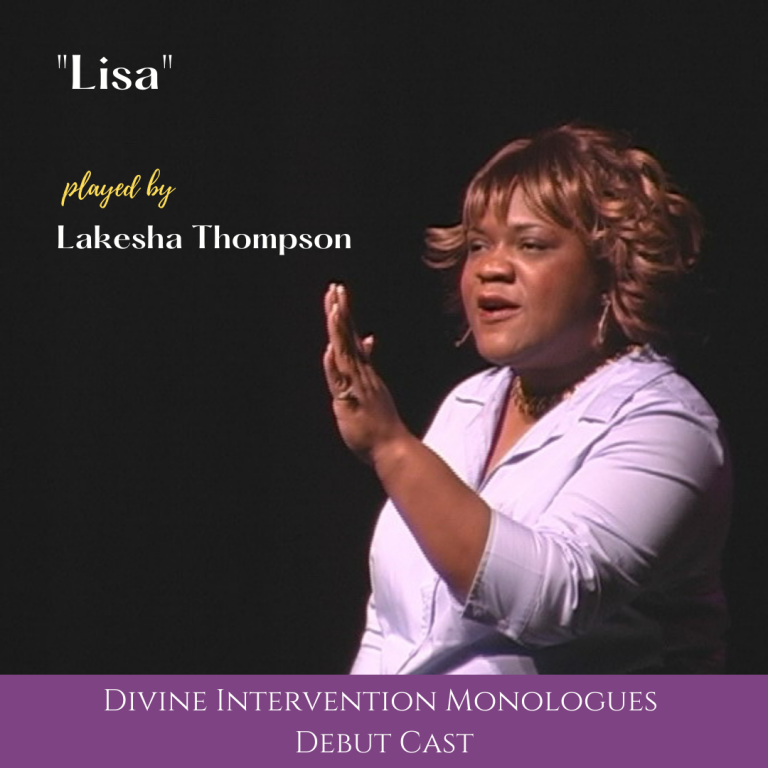
"But see, I wanted to tell them, “Us poor mammas are scared of the emergency room for the simple fact the socials be swarming us in there like bees on honey; just like they ready to take our children.” But you go to a rich hospital and children come in there with all kind of child abuse injuries and broken bones and they get to go home. But us poor mammas catch a case if our children got a cold. But anyway, the social worker came by my house before he came home. So, when she came by, she saw my house in the Rough and she said, “Lisa, [in sad social worker voice] we can’t let him come home to this apartment.” I said, “Wait a minute before you put him in state custody, my mamma can get him. My mamma got a big house and ain’t nobody there but her.” They called mamma and she came right on and got me out of that jam."
"Lisa" Tweet

"I think she thought since I was being honest that she would do me a favor and put me in what she thought was a real good program, but it actually ended up being a hospital for rich white folks who had cocaine addictions. They was getting treated for mental health, not substance abuse. It wasn’t no other crack addicts out there; just old white men and some women, but I was the youngest person and the only black there and I just didn’t fit in. It was nice, don’t get me wrong. They had it set up like the Ritz Carlton. I stayed about a week and after the doctor evaluated me, he said “It’s nothing we can do for you in this program.” So when I got out of there, I just went back and started smoking crack ‘cause that hurt me real bad when that doctor said he couldn’t do nothing for me. I mean can you imagine how it feels when a doctor say he can’t do nothing for you?"
"Kawana" Tweet

"But you know what? I sleep with as many married men as I can. In fact, I target married men and I try to look good and do whatever they want done ‘cause somebody gave this to me and I don’t care who get it! Don’t you judge me! It would blow your mind for real if you knew who was coming over here picking up women. But I ain’t going to say nothing. I’ll just let ya’ll keep thinking you safe ‘cause you don’t smoke dope and don’t turn tricks…well really you turn tricks, but you do it on that private style. What they say, “You a private dancer.” Been there, done that! I’m public with mine. And I hear a lot of people talking about these girls on drugs must have been abused! Don’t ever think that about me. I never ever got beat, or yelled at as a child. I was my daddy’s heart. I never ever got on punishment or beat or nothing. And my mother can’t understand it and I just tell her, “I don’t know.” I had no reason. I got everything I wanted. I had four dollhouses. I was spoiled rotten. I had the best life. I don’t know what happened."
"Teresa" Tweet

"He used to have me downstairs where he had his own room. And then when I was five years old that man - ‘cause see I don’t call him granddaddy - anyway, that man ask me if I want to grow up. He took me downstairs talking ‘bout he gone help me be a big girl. The rest of the family upstairs and they didn’t even know. But my uncle caught him and he beat him down. He say, [in concerned uncle voice] “Lolita, I am so sorry you had to go through that.” And that made me feel better that somebody took up for me. And my grandma, she was so weak and she was so into the Lord, you know, she thought the Lord would handle it. So, by the time I turned 12 when my uncle finally caught him, I had it in my heart to kill him. I wanted to poison him and make the next biscuit he ate his last bite in this life. I had just that much hate in my heart. And I ain’t got over that yet. I’m still angry about that ‘cause he took my whole childhood. I can’t read and write to this day ‘cause I didn’t have no confidence in my schoolwork with him messing with me every day and I couldn’t concentrate on no school."
"Lolita" Tweet

"Now true, there are times I don’t use condoms, but see that be with my married men ‘cause they can’t carry condoms ‘cause they be getting in trouble with they wives. And if it’s just me and him and her, then we not really in danger. But I done seen some of them with other girls, and I hope they use condoms with them or else they putting me and they wife at risk. A lot of them be talking about they wish I could be they wife. And one of them paid me to take my braids out and wear my hair down. Then come to find out, more men like my hair down like this, so I catch more dates with it down, but trying to maintain it…whoooweee!"
"Michelle" Tweet

"My counselor said, “Suppose you had AIDS?” I said, “I got it?” She said, “I didn’t say that now, but supposed you did, what would you do right now?” I almost got happy, ‘cause see if I had AIDS, I would have a chance. All them women I know from over this way that got AIDS, they get free drug treatment, get them a nice apartment and a job when they get off drugs and everything. So, to be honest, when she told me I didn’t have it, I was like, “Well, there go my ticket out the Rough.” ‘Cause for us at the bottom the only way we goin’ to live nice is to get help from the AIDS programs. We hear stories all the time ‘bout how they get them a nice apartment, get they bills paid, get all the medical help they need. They go to the best treatment centers for they drug problem. They get a job as a peer educator and they get to go to school. I done seen them get they teeth fixed, get they hair done, they face clear up and all that. So I ain’t saying that I wanna get HIV ‘cause they do get sick sometime with it, but if I get it, I feel like I can get a helping hand better with AIDS than just going trying to get help looking crazy."
"Johnsie" Tweet

"I be laughing at ya’ll ‘cause Oprah got ya'll looking out for the “down low”. What ya’ll need to look out for is the “low down”. See they got ya’ll scared to tell the truth. I just wish ya’ll could see that he addicted to sex, and I’m addicted to drugs and you addicted to the lifestyle he affords you. So we all tied up in this together. And I hope whoever hear this they stop judging us hookers ‘cause we only got a job ‘cause they ain’t doing their’s. If they really knew how sexually sick some of these so called husbands and boyfriends really is, they would be very scared. I’m a hooker and they scare me sometimes with the request they have. I mean, why you think so many black women got HIV who ain’t never smoked no dope, got a good job, live in a nice house, don’t have but one man, ain’t hooking, but they go for a regular medical checkup, and they find out they ‘bout to check out! I mean ya’ll be calling me a prostitute. [mocking how someone might say this] “Oh, she a crack whore.” Well, every time you have sex with your husband and you not in the mood, (pause) you doing sex work. I do sex work to maintain my habit. You do sex work to maintain your household."
"Punkin" Tweet

"At first I’m talking to them like they children, but when he pulled that pistol out, I just froze. Tears started rolling. I looked at each and every one of them boys and I knew they was going to kill me just to get respect. And I started praying to my good Lord 'cause I thought I was coming to see him. I could see my life flashing before me. That's the second time I done had a pistol pulled on me and it's a eerie feeling. But that time I just knew it was my last. It was semi-dark; about eight thirty in the evening. And there was nobody around. And seem like time just stood still. And I couldn’t open my mouth. I just prayed in my heart. And right at that very moment when he cocked that pistol and was just about to put it to my head, a friend of mine was coming around to find him some drugs and seen me jammed up. And instead of him buying him some drugs he took his money and paid my drug bill off. He said, “Pamela, it’s time for us to clean up before one of us get killed.” And when I saw him with that junkie itch, scratching, and looking sick because he really needed a fix hisself, that’s when I started the cleaning process."
"Pamela" Tweet
Since its debut in 2007, I have partnered with several organizations in producing “The Divine Intervention Monologues”. Listed in alphabetical order, the following organizations have provided financial and in-kind support for performances: AID Atlanta, The Centers for Disease Control and Prevention, Clark Atlanta University, The National Coalition of 100 Black Women: Metropolitan Atlanta Chapter, The Department of Health and Human Services’ Office on Women’s Health, Emory University, GMHC, Iris House, Mary Hall Freedom House, SisterLove, Savannah State University, and The Substance Abuse and Mental Health Administration.
As exemplified in the letter from the CDC conference team below, evidence-based research can be legitimately shared using the performing arts.
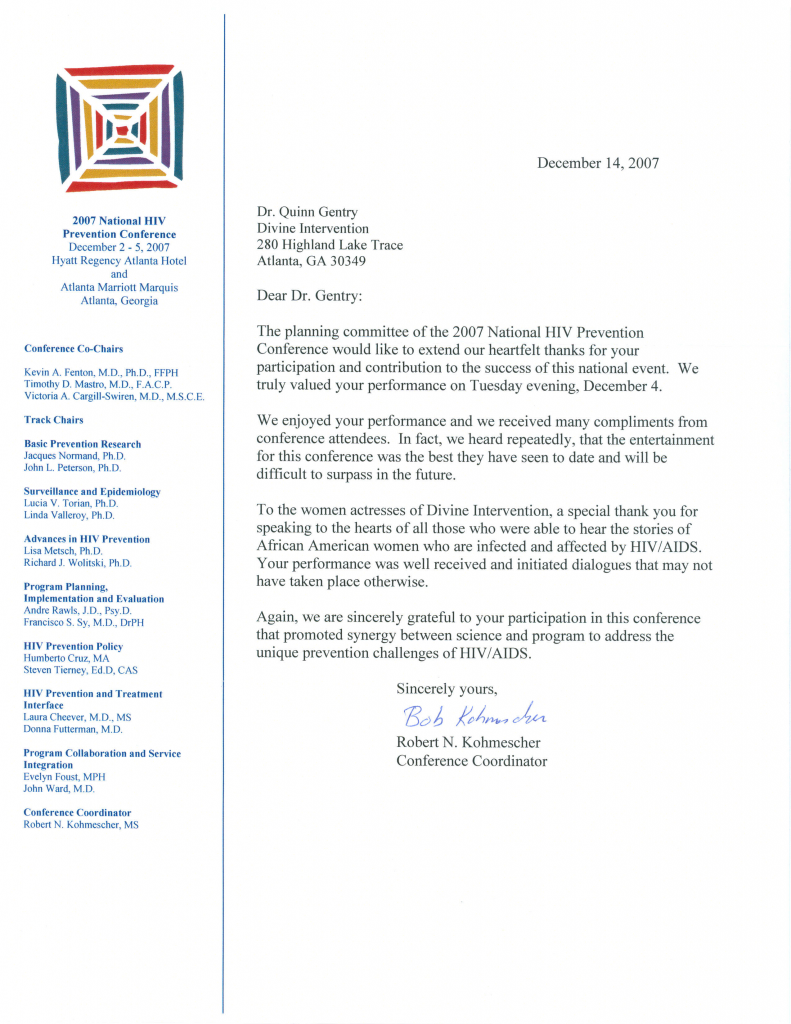
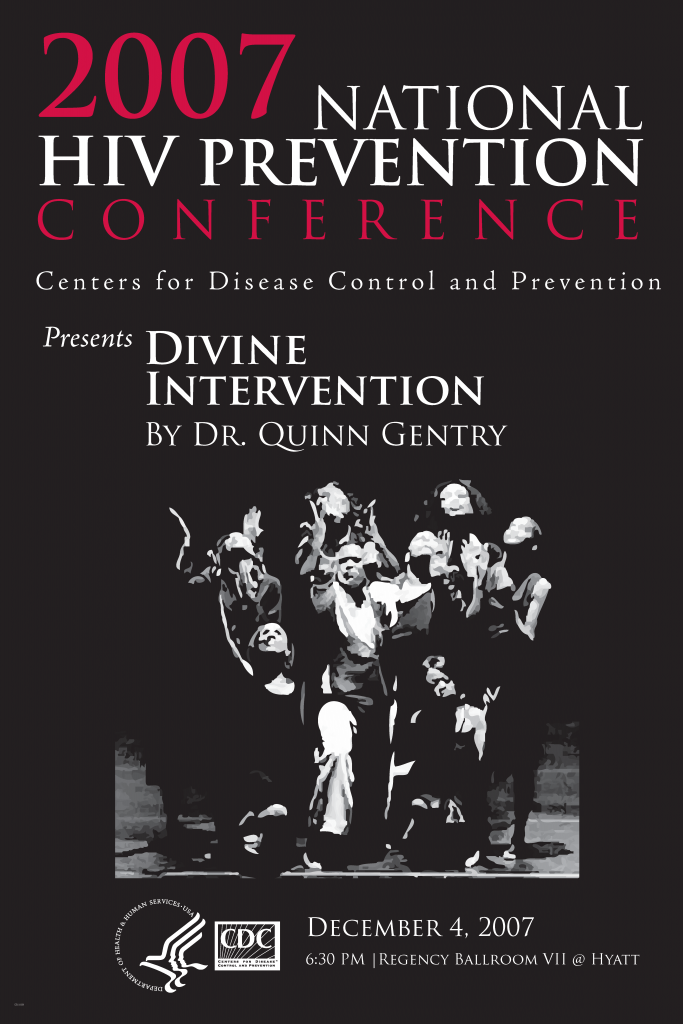
I hope that my "Divine Intervention Monologues" inspired you to search for innovative performing arts strategies to raise awareness about the complex factors associated with the public health threats you tackle. At the personal level, whether you work in clinical research, community programs, or civic engagement, never forget that when you encounter a woman deemed at risk for a plethora of social and health issues, your interaction may serve as her last hope for escaping misery.
You just may be her "Divine Intervention."Dr Quinn, Intellectual Influencer Tweet
More by Dr. Quinn M. Gentry here.
HPHR.org was designed by ComputerAlly.com.
Visit HPHR’s publisher, the Boston Congress of Public Health (BCPH).
Email communications@bcph.org for more information.

Click below to make a tax-deductible donation supporting the educational initiatives of the Boston Congress of Public Health, publisher of HPHR Journal.![]()